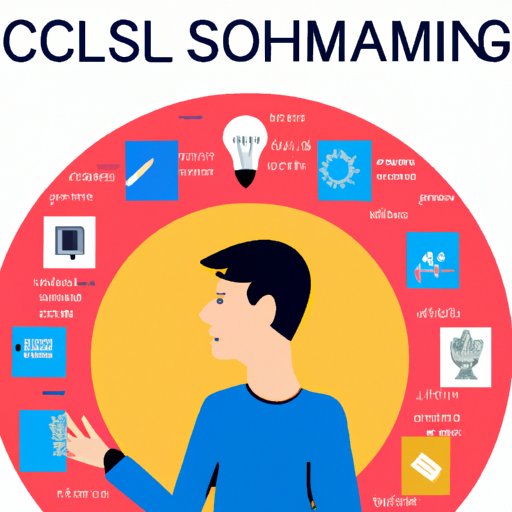Introduction
Computer science is an ever-changing field that requires dedicated study in order to keep up with the latest advances. For those without access to formal education, it can be challenging to figure out how to learn computer science on their own. Fortunately, there are plenty of resources available to help you get started.
In this article, we’ll explore the fundamentals of computer science, discuss how to go about learning it on your own, and provide tips on creating a personalized curriculum. By the end, you’ll have a better understanding of what it takes to become an autodidact in the field of computer science.

A Guide to Learning Computer Science on Your Own
The first step in teaching yourself computer science is to familiarize yourself with the necessary tools and resources. There are numerous books, articles, tutorials, videos, and other materials available online that can help you understand the basics of computer science. Additionally, there are many open source projects and software packages that can be used to practice coding and gain experience.
Once you have the necessary resources, it’s important to understand the basic concepts of computer science. This includes topics such as algorithms, data structures, programming languages, databases, operating systems, and networking. It’s helpful to start by reading some introductory texts on these topics, then move on to more advanced material as you gain confidence and knowledge.
It’s also essential to explore different programming languages. Different languages have different strengths and weaknesses, and knowing which language is best suited for a particular task is an important skill. Start by learning one language, then try others as you become comfortable with the basics.
Developing good study habits is also essential to success when learning computer science on your own. Set aside time each day to study and practice coding. Take notes, ask questions, and get feedback from experienced programmers. And don’t be afraid to make mistakes – they’re part of the learning process!
How to Take the Self-Study Approach to Computer Science
When taking a self-study approach to computer science, it’s important to create a personalized curriculum. This should include identifying your goals and objectives, choosing appropriate resources and tools, and setting a schedule and milestones. It’s also helpful to break down complex tasks into smaller, more manageable pieces. This will make it easier to focus on the task at hand, and will help you track your progress.
Taking advantage of online courses is also helpful. There are many free and paid courses available that can teach you the basics of computer science. Additionally, there are plenty of open source projects that can help you gain experience in coding. Participating in these projects can help you stay motivated and committed to your studies.
Finally, don’t be afraid to ask for help and guidance. There are many experienced programmers who are willing to share their knowledge and advice. Joining online communities and forums is a great way to connect with others who are interested in computer science.
Exploring the Benefits of Teaching Yourself Computer Science
Learning computer science on your own has numerous benefits. One of the most obvious is increased flexibility in learning. You can learn at your own pace, and you can tailor your course of study to your specific interests and goals. Additionally, you can gain practical experience and real-world applications through open source projects and volunteer work.
Self-learning computer science also helps to improve problem-solving skills. As you gain experience, you’ll be able to think more critically and come up with creative solutions to complex problems. Finally, learning computer science on your own is often much more cost-effective than traditional educational methods.

Creating a Personalized Computer Science Curriculum
Now that you know the basics of computer science, it’s time to create a personalized curriculum. Start by identifying your goals and objectives. Do you want to become a professional programmer? Are you looking to build a website or develop an app? Once you’ve identified your goals, you can begin to choose appropriate resources and tools.
Next, set a schedule and milestones. Decide how much time you’ll dedicate to studying each day, and set deadlines for completing certain tasks. Finally, determine when you’ll take breaks and reward yourself for accomplishments. Having a plan in place will help keep you organized and motivated.
The Autodidact’s Journey: Learning Computer Science Alone
Learning computer science on your own can be a challenging journey. It’s important to stay motivated and committed to your studies, even when you’re facing challenges and obstacles. It’s also helpful to develop creative solutions and think outside the box when tackling difficult problems.
Finally, don’t forget to ask for help and guidance. Experienced programmers are often willing to lend a helping hand, and joining online communities and forums can be a great way to connect with like-minded individuals. With dedication and hard work, you can become an autodidact in the field of computer science.
Conclusion
In summary, it is possible to learn computer science on your own. The key is to familiarize yourself with the necessary resources and tools, understand the basics of computer science, and explore different programming languages. Additionally, it’s important to create a personalized curriculum and develop good study habits. Finally, don’t forget to take advantage of online courses and open source projects, and to ask for help and guidance when needed.
Learning computer science on your own can be a rewarding experience. With dedication and hard work, you can become an autodidact in the field of computer science.
(Note: Is this article not meeting your expectations? Do you have knowledge or insights to share? Unlock new opportunities and expand your reach by joining our authors team. Click Registration to join us and share your expertise with our readers.)
